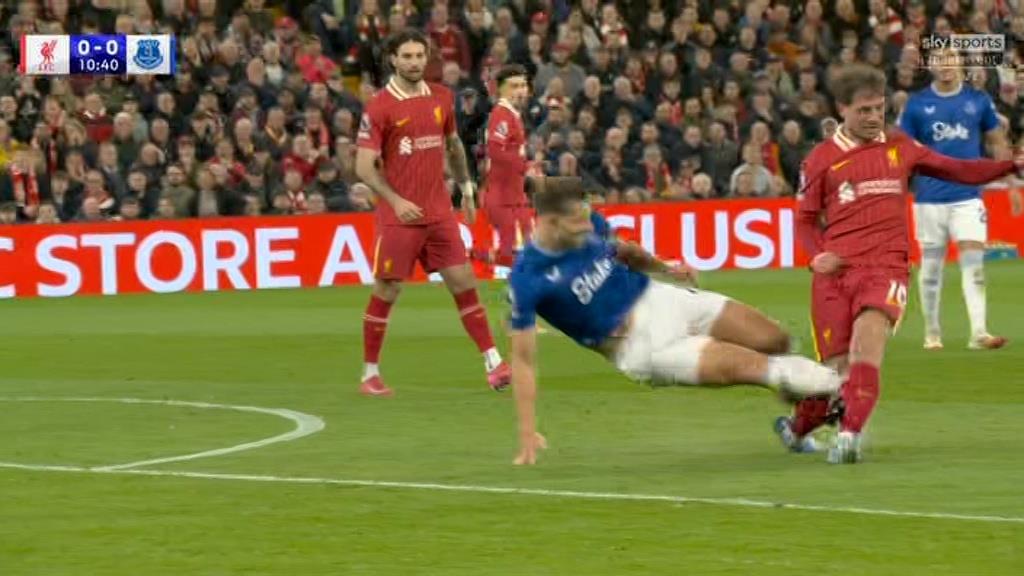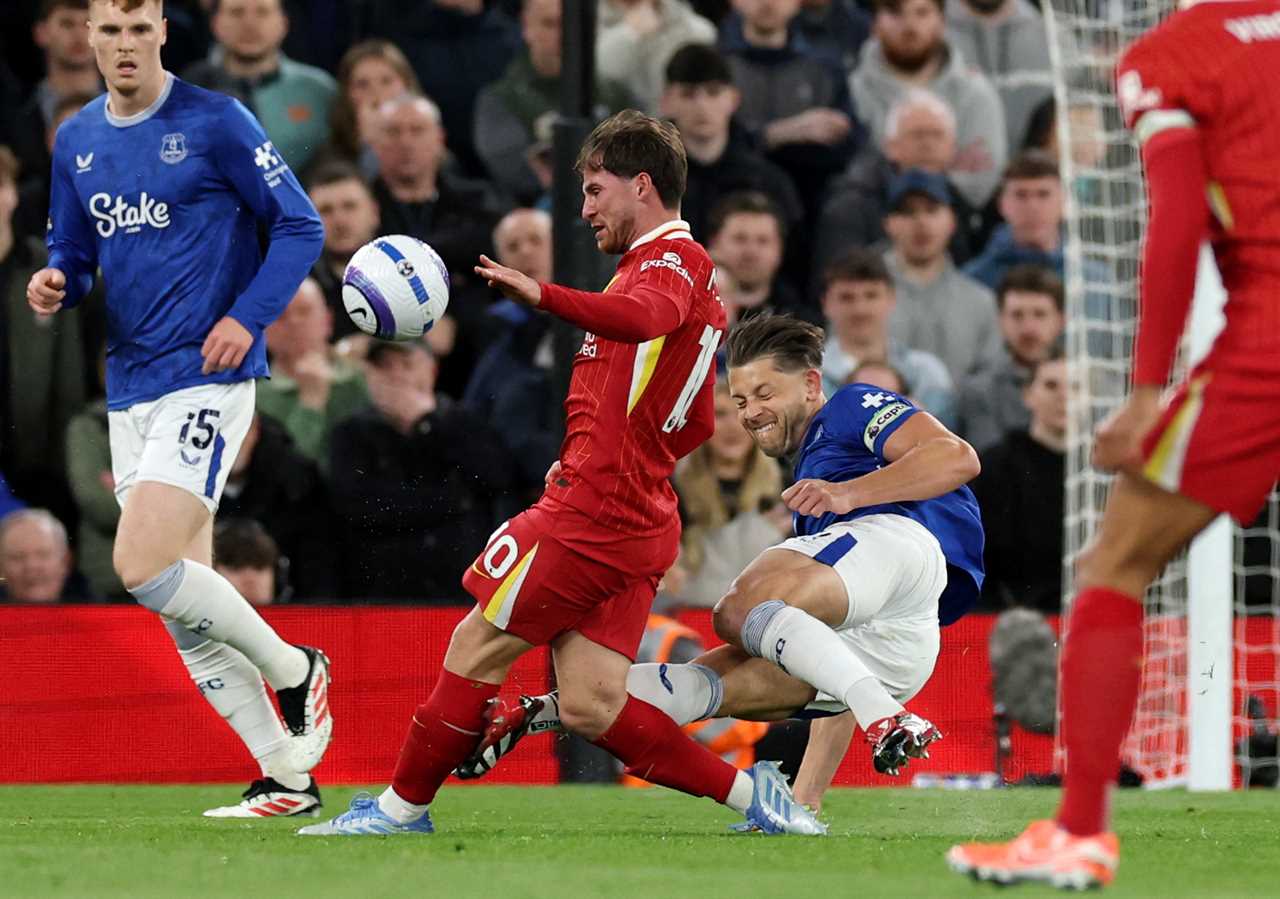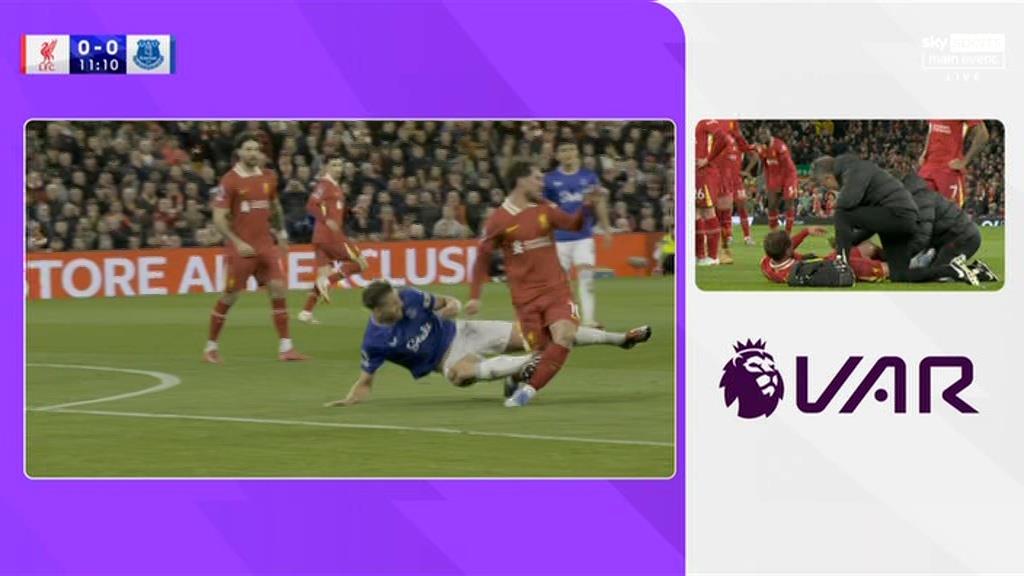
Brutal Challenge Leaves Mac Allister Wounded
In a match that had fans on the edge of their seats, Everton captain James Tarkowski delivered a harsh tackle on Liverpool's Alexis Mac Allister just 10 minutes into the Merseyside derby. The defender executed a sliding challenge to win the ball, resulting in a collision that left the Argentine midfielder visibly injured. Tarkowski's boot made significant contact with Mac Allister's leg, prompting immediate concern from both teams and spectators alike.
VAR's Decision Upholds Yellow Card
The incident was swiftly reviewed by Video Assistant Referee (VAR) official Paul Tierney. However, contrary to expectations, Tierney did not recommend a second review of the tackle. Referee Sam Barrott initially issued a yellow card, classifying Tarkowski's action as reckless. The Premier League later clarified the decision, stating that the contact during the follow-through amounted to a reckless foul under league guidelines.
Understanding the Card Controversy
According to Premier League regulations, a reckless foul warrants a yellow card, whereas a red card is reserved for challenges deemed to be "endangering an opponent" or involving "excessive force." In Tarkowski's case, neither criterion was met to justify a red card. This interpretation has stirred debate among fans and pundits, with some arguing that the nature of the tackle should have warranted harsher punishment.
Former Referee Criticizes the Ruling
Adding fuel to the controversy, former Premier League referee Mike Dean, who was watching the game for Sky Sports News, voiced his strong disagreement with the decision. Dean described Tarkowski's tackle as "awful" and argued that the defender's speed, intensity, and force were beyond what should be allowed on the pitch. He firmly believed that Barrott should have issued a red card, stating, "For me he should have gone to the screen, should have sent Tarkowski off – 100 per cent."

Tarkowski Ties Premier League Booking Record
The yellow card from this contentious tackle ties James Tarkowski with Oriol Romeu for the most yellow bookings in Premier League history without being sent off. Tarkowski has now accumulated 63 yellow cards over 300 appearances in England's top flight. This record highlights the fine line defenders walk between aggressive play and disciplinary action in high-stakes matches.
Everton's Resilience at Anfield
Despite the early setback, Everton demonstrated their determination by causing ongoing problems for Liverpool throughout the match. Everton's forward, Beto, had a legitimate goal disallowed for offside in the 21st minute. The Brazilian striker later made a daring run on goal, only to see his shot strike the post, leaving Liverpool's fans holding their breath.
Aftermath and Reactions
Following the intense tackle and subsequent booking, the game continued with Liverpool attempting to regain control. Dominik Szoboszlai missed the free-kick that arose from the incident, limiting Liverpool's momentum. Everton's ability to withstand Liverpool's pressure showcased their tactical discipline and resilience, further intensifying the rivalry between the two sets of fans.
Looking Ahead
The Merseyside derby once again underscored the passion and intensity that define one of English football's fiercest rivalries. As Tarkowski joins the ranks of the most booked players in Premier League history, discussions about fair play and the role of VAR in officiating are likely to continue. Both teams will look to build on their performances, with Everton aiming to leverage their solid defensive play and Liverpool striving to overcome early challenges.

As the season progresses, matches like this one highlight the critical role of discipline and decision-making in determining the outcomes of high-profile games. Fans will undoubtedly be watching closely to see how these dynamics unfold in future encounters between these two storied clubs.
Frequently Asked Questions
How can I improve my technique in football?
Consistent practice and a strong focus on fundamentals are essential to improving your football technique. The importance of regularly performing drills to improve ball control and accuracy in passing and shooting is paramount. A technique that is greatly enhanced by focusing on improving the balance and coordination of your weaker side and perfecting it through agility training will also be improved. You can improve your technique by observing professional footballers. Analyzing their positions, movements, and decisions.
What are the fundamental skills necessary to play great soccer?
To be a good football player, you need to develop technical, tactical and physical skills. Technical skills can include ball control and dribbling. They also include passing and shooting. Tactical awareness includes knowledge of the game including movement, positioning and decision-making. Physical attributes such as speed, endurance, and strength are crucial for performance. Mental toughness, focus and the ability of remaining calm under pressure is crucial for maintaining performance during a match.
How important is nutrition and diet for a professional football player?
Nutrition is an integral component of a football player's performance and recovery. It is vital to have a healthy, balanced diet, which includes the right mix of carbohydrates, protein, fats, vitamins and minerals. Dehydration, which can affect performance in a negative way, is another important factor. Timing of meals and specific nutrition strategies can vary depending on training and match schedules, and it is often beneficial to consult with a sports nutritionist to develop personalized dietary plans.
What is the most effective physical conditioning for football players?
A well-rounded conditioning programme for football players should focus on different aspects of fitness. This includes aerobic exercises for endurance, sprint training for speed and agility, strength training to improve power, and flexibility routines to prevent injury and enhance recovery. Also, using sport-specific exercises that mimic match conditions is beneficial to prepare the body for football's physical demands. The program can be tailored to the needs of each person by working with an accredited fitness professional or coach.
How do I become a competent football goalkeeper
To become a skilled goalkeeper, you need to focus on agility, reflexes and positioning. A goalkeeper should be proficient in stopping shots, commanding the penalty area with catching and punching skills, and distributing both with hands and feet. Goalkeeping requires the goalkeeper to have a high level of mental resilience and decision making under pressure. They must also communicate effectively with their defense. To master the art, you must practice regularly, get constructive feedback from your coaches and analyze your performances to identify improvement areas.
Statistics
- Goalkeepers who engage in specialized reaction-time training reduce their goals-conceded tally by an average of 25% over a season.
- Studying match footage for at least 4 hours a week can lead to a 10% improvement in a player's tactical awareness on the field.
- Players who train for more than 10 hours a week show a 20% improvement in technique compared to those who train for less time.
- Defensive units that practice coordinated drills together at least twice a week concede 18% fewer goals in match play.
- Youth players who participate in football education programs have a 35% higher chance of being scouted by professional clubs.
External Links
How To
How To Master The Fundamentals Of Football
It takes dedication and constant practice to master the basics of football. You can start by improving your ball control. This includes dribbling, passing, and striking the ball accurately and with power. Concentrate on first-touch exercises to efficiently control different types passes. To improve coordination and familiarity, try juggling. Remember that the foundation for great football is a flawless execution and training of these key components.
 CricketBoxingFormula 1GolfHorse RacingPremier LeagueTennisPrivacy PolicyTerms And Conditions
CricketBoxingFormula 1GolfHorse RacingPremier LeagueTennisPrivacy PolicyTerms And Conditions
